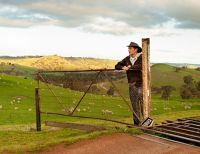17 May 2023
 Changes to Australia’s mental health and suicide prevention system must be underpinned by lived experience to ensure appropriate care, say experts at the University of South Australia.
Changes to Australia’s mental health and suicide prevention system must be underpinned by lived experience to ensure appropriate care, say experts at the University of South Australia.
Following the announcement of $586.9 million of federal funds to overhaul Australia’s mental health system, UniSA’s Professor Nicholas Procter and Dr Mark Loughhead say that lived experience can facilitate a better balance between the needs of consumers, carers and mental health professionals.
The call draws upon research in a UniSA spotlight report developed for the National Mental Health Commission.
Australia's representative to the International Association for Suicide Prevention, and Director of UniSA’s Mental Health and Suicide Prevention Research and Education Group, Prof Procter, says lived experience leadership will improve the quality of decision making and credibility of consumer and carer perspectives across mental health systems.
“One of the enduring challenges across the health sector is to effectively understand and respond to the diverse needs of different people and groups,” Prof Procter says.
“In mental health, this is particularly complex as we’re supporting people who have very significant mental health conditions, and we need to provide care which responds to drivers of distress, the wishes of the person, builds their capacity, and enables psychological safety for them, families and kin and staff.
“Leaders with lived and living experience – people who have a personal perspective and experiences of significant mental health and suicide related issues and distress – are able to help design and build care systems because they have the unique wisdom and insights to offer. They can help balance clinical and consumer perspectives.”
In Australia, more than two in five Australians experience a mental health issue in their lifetime. In 2020–21 more than 3.4 million Australians sought help from a health care professional for their mental health.
Concerningly, across their entire lifetime around one in six Australians reported having had suicidal thoughts or behaviour, with 38 per cent of Australians reporting they were close to someone who has attempted or died by suicide.
The spotlight report calls for co-designed systems where both person-centred care and consumer-directed care work are delivered consistently for consumers, families and kin. These are empowering approaches to mental health care, which work from the person’s own story and wishes, includes their whole life needs and involves family or carers in decision-making. Consumer-driven care gives individuals greater decision-making capabilities over the care they receive, allowing them to tailor care to meet their needs.
Co-researcher, UniSA’s Dr Loughhead says that lived experience leadership will help services bring these care concepts to life.
“When people have a lived experience of mental health and recovery, they bring deep insights and understanding about the impacts of issues and using services. They are often more in tune with the different interests and conflicts within organisations and communities and can advocate for improved services.” Dr Loughhead says.
“Leaders are people who have stood up and decided that change is needed. They have developed their capacity to advocate and share knowledge on access and inclusion with mental health specialists. Many people have also become peer workers which is a growing workforce across mental health.
“Importantly, a system that is grounded by lived experience recognises and values consumers, carers, and families, and strengthening their voice in treatment and care processes.
“Lived experience is all about promoting personhood and humanity. It challenges long-held stigmas associated with mental health to ensure we ‘see the person, not the label or work title’ which is a much more inclusive model of consumer care, and a best-practice initiative to deliver mental health supports.”
Notes to editors:
Lived experience is one of eight key recommendations within the spotlight report:
- Strengthen practitioner education and training on essential knowledge and skills.
- Embed supported decision-making practices including mental health advanced care directives and ‘nominated’ support people, as well as other ways of recognising autonomy within mental health legislation.
- Create a national program for strengthening leadership and championing for organisational change in public mental health services.
- Strengthen lived experience leadership in service governance and in the workforce.
- Develop a focus on ‘relational recovery’ and fund new programs which work holistically to respond to intersecting social determinants and related drivers of distress and crisis.
- Promote and fund crisis response models that emphasise dignity, personal safety and cultural safety.
- Fund lived experience organisations to co-design local mental health programs in partnership with specialist public mental health services.
- Fund lived experience organisations to provide peer navigation services and develop better care pathways within health systems.
To access the spotlight report, visit: https://bit.ly/44NCImC
…………………………………………………………………………………………………………………………..
Media contact: Annabel Mansfield M: +61 479 182 489 E: [email protected]
Contacts for interview:
Prof Nicholas Procter: E: [email protected]
Dr Mark Loughhead E: [email protected]














